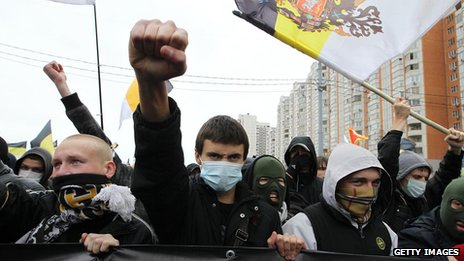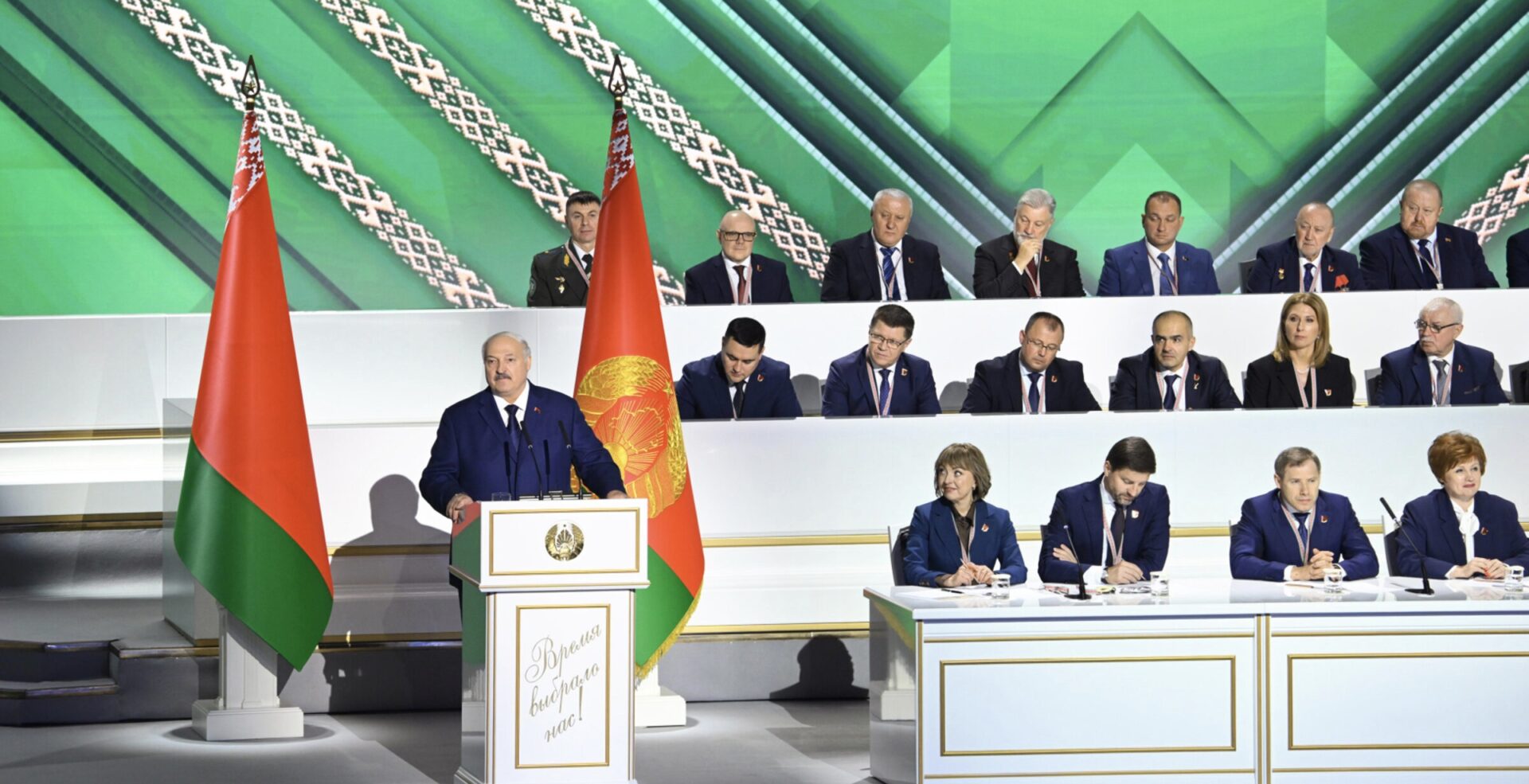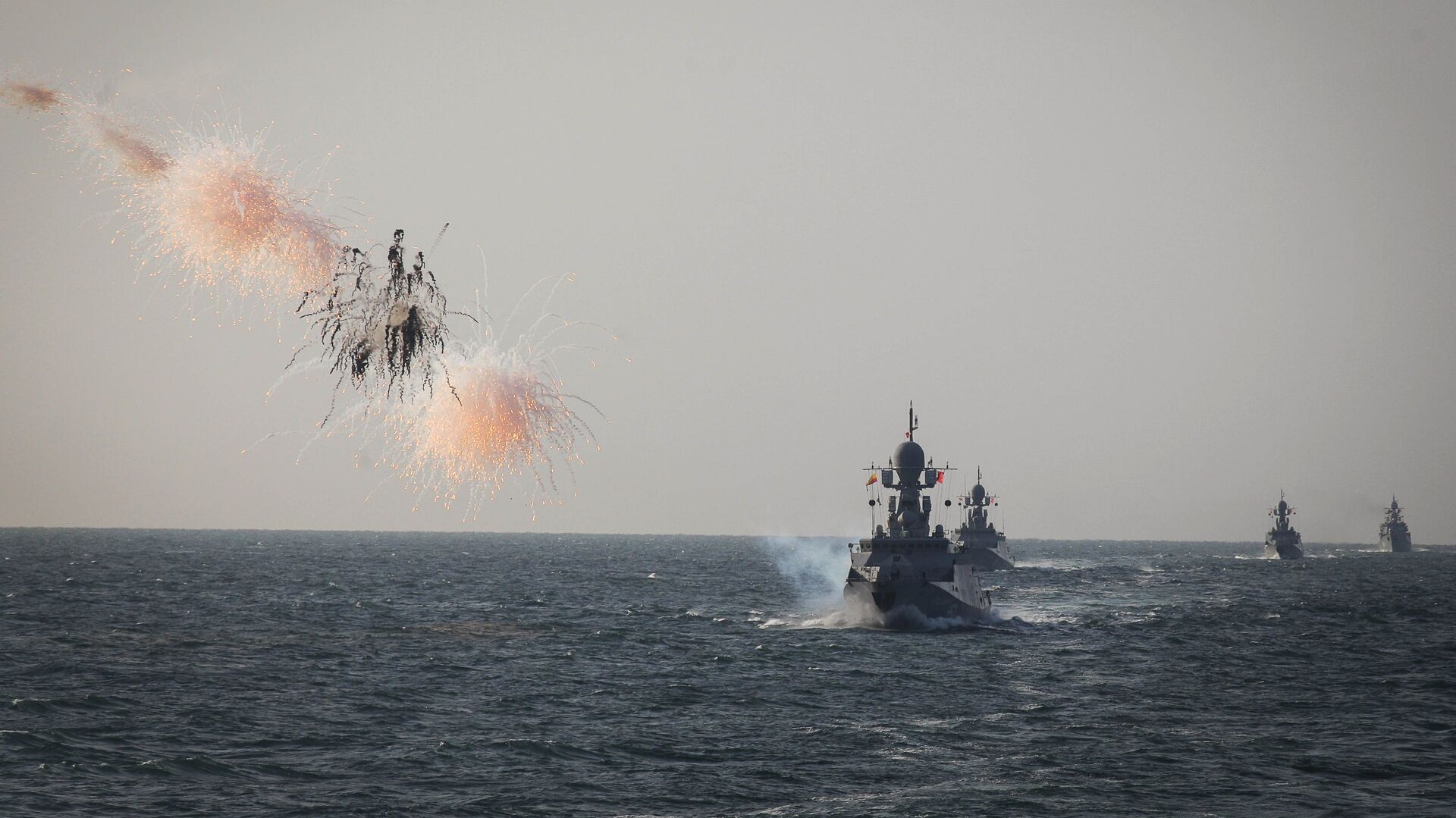
Russian Neo-Nazis ‘Celebrate’ Hitler’s Birthday, Part One: Background
Russian Neo-Nazis ‘Celebrate’ Hitler’s Birthday, Part One: Background
Like Neo-Nazis in other countries, Russia’s own Neo-Nazi subculture commemorates the birthday of Adolf Hitler on April 20. What is distinct, however, is the degree to which Russia’s Neo-Nazis “celebrate” with a large number of attacks against members of ethnic minorities. As this date approaches, the country is bracing for fresh incidents of racially-motivated violence. Part One in this two-part look at the Russian extreme right’s annual attacks on minorities will briefly examine the recent history of this phenomenon. Part Two in this series will then look back at April 20, 2013, and analyze what transpired this year as well as how Russian federal and municipal authorities handled the security risk posed by domestic Neo-Nazi groups.
The level of Russian Neo-Nazi attacks coinciding with Hitler’s birthday has become so serious in recent years that starting in 2002, the Russian authorities in Moscow, St. Petersburg and Nizhny-Novgorod started advising racially different students not to leave their dormitories on April 20 (https://www.newsru.com/russia/14apr2008/hitler.html). In the last few years, there have been a number of troubling attacks. In 2009, for instance, Neo-Nazis murdered a Tajik man and an Uzbek man in Moscow, attacked Caucasian men in Stavropol and assaulted anti-fascists in St. Petersburg (Bigotry Monitor, 2009). In 2010, Neo-Nazis in Moscow killed an Arab refugee and two Kalmyk students (https://www.mk.ru/incident/article/2010/04/21/473502-den-rozhdeniya-gitlera-skinhedyi-otmetili-v-svoem-stile.html). Hitler’s birthday is just one of a number skinhead “holidays” celebrated in Russia. Possibly the most significant other than Hitler’s birthday is November 4, National Unity Day, on which Neo-Nazis have organized a “Russian March” since 2005, which has been spearheaded by the leaders of the Russkie faction of the protests against now-President Vladimir Putin, Dmitry Demushkin and Alexander Belov (https://www.sova-center.ru/racism-xenophobia/news/racism-nationalism/2012/11/d25713/). The other holiday punctuated by racist violence is August 2, Paratrooper’s Day. Hitler’s birthday, coming on April 20, occupies a unique place for skinheads as the most unambiguously Neo-Nazi holiday on the calendar. It also comes close to Victory Day on May 9, which commemorates Russia’s victory over Hitlerism. Finally, late April has a general appeal for Russians: spring time in Russia generally sees a revival of street life as the country emerges from the long winter.
Commemorative acts remembering the Fuhrer’s birthday began in 1980 when groups of crypto-fascists held demonstrations in Pushkin Square in central Moscow (https://newsland.com/news/detail/id/491782/). Most of the protestors in the late Soviet period were driven by anti-Semitism. Demonstrations continued to mark the Fuhrer’s birthday long after the Soviet Union’s collapse. Two notable simultaneous Moscow protests occurred in 2007: One, a demonstration on Slavyansk Prospekt with the participation of National Socialist Organizations (NSO), “Format-18,” the “Rus” organization as well as “Russian Will,” attended by 150 people and headed by Dmitry Rumtsev; Two, a separate protest was organized by Dmitry Demushkin and his skinhead gang “Slavic Union” (Slavyansky Soyuz) on Pushkin Square (https://jewish-info.ru/site.php?id=922&sid=694). In 2009, soccer fans from one of the Moscow clubs held a banner saying “Happy Birthday, Grandfather” on April 20 (https://www.newizv.ru/lenta/2011-04-18/143794-druzhinniki-budut-patrulirovat-moskvu-v-den-rozhdenija-gitlera.html). Such banners were seen again in 2012 in Ryazan, Tula, and Nizhny Tagil (https://www.sova-center.ru/racism-xenophobia/publications/2013/03/d26655/), suggesting that the association of soccer with racism remains a constant in Russia.
Anti-Semitic violence accompanying the demonstrations on April 20 also became a tradition by the late Soviet period. In 1987, fascists demonstrated in Leningrad, with a procession around a Jewish graveyard and occasional property damage (https://newsland.com/news/detail/id/491782/). In 2002, an act of arson was committed against a synagogue in Omsk on Hitler’s birthday. In 2006, skinheads attacked a Jewish Cultural Center in Ulyanovsk (https://jewish-info.ru/site.php?id=922&sid=694). However, just as the focus of fascist violence has in general moved away from an (exclusive) concentration on Jews to all non-white minorities in post-Soviet Russia, so have the targets of violence on Hitler’s birthday. In 1998, skinheads attacked mainly African and Asian targets and promised to kill all the foreigners whom they saw on the streets of Moscow on April 20. Skinheads in 2012 declared a “white wagon”—a form of attack whereby skinheads beat everyone in a train car who is not white—on a suburban train (elektrichka) from Moscow to Tver (https://www.sova-center.ru/racism-xenophobia/publications/2013/03/d26655/). In this way, then, the meaning of violence on Hitler’s birthday has changed according to the demographic shifts of Russian society in the post-Soviet period.
While the police has told racially different students not to leave their dormitories on April 20 and to take extra care in the time around that date, local human rights organizations have fought back in other ways. In 2011, for example, the human rights community arranged 750 people into volunteer-brigades to patrol public spaces in Moscow and stop racist violence https://www.newizv.ru/lenta/2011-04-18/143794-druzhinniki-budut-patrulirovat-moskvu-v-den-rozhdenija-gitlera.html). The volunteers for these patrols have official endorsement from the ruling political party, United Russia.
The police also try to take a pro-active approach to arresting those who contravene article 282 of the Russian constitution, which prohibits incitement of ethnic or religious hatred. In 2012, for example, the police detained protestors in Volgograd for distributing copies of a German portrait of Hitler as well as arrested demonstrators in the Olympic city of Sochi for the distribution of extremist materials (https://www.sova-center.ru/racism-xenophobia/publications/2013/03/d26655/). Given the Kremlin’s recent crackdown on human rights organizations (see EDM, April 1, 11), however, such attempts at preventing more demonstrations and actions seem more than a little feeble.
The attitude of the authorities to events on Hitler’s birthday can be taken as a measure of how seriously they take the Neo-Nazi threat in Russia. This year, the main organizations promoting actions on that day are Demushkin’s skinhead gang “Slavic Union” and Belov’s “Movement Against Illegal Immigration” (known by its Russian acronym DPNI and an explicitly racist movement). Both organizations offer forums for discussion of protests and actions. The Kremlin does have the ability, therefore, to take real pre-emptive action to disturb these upcoming events before they spiral into open violence. Yet, considering the authorities’ inadequate response in previous years and the government’s preoccupation with other issues such as international crises and the economy, it seems probable that Russia’s human rights community will again be the only line of defense against violent extremism on Hitler’s birthday.


